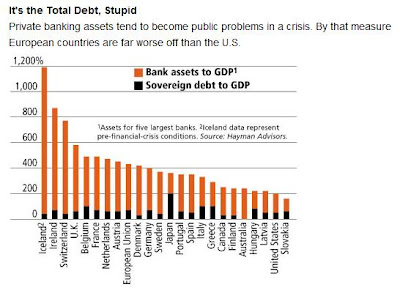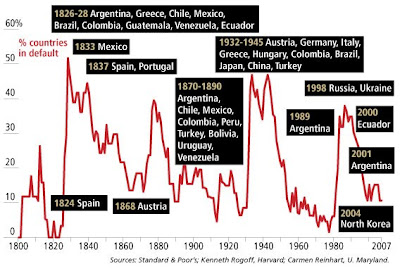The Coming Default Tsunami Grabs Power From Banking Industry
This year's World Economic Forum in Davos marks a clear shift in the global power structure. "Bankers Are On Run", headlined the Wall Street Journal in its weekend edition, describing an atmosphere of, quote, "First, kill all the bankers."
Its ramblings went on to forecast the worst is yet to come, elaborating on a bet that even Goldman Sachs CEO Lloyd Blankfein would be out of his job within 2 years. Witness the biggest shift in editorial sentiment ever seen when the WSJ starts comparing bankers to terrorists,
The ire directed at bankers from all sides is palpable, acknowledged Donald Moore, chairman of Morgan Stanley in Europe, as he stood alone reading some charts amidst the hubbub at the forum's Global Village cafe. Asked which other groups of people have been similarly unpopular in Davos in the past, he said: "terrorists."...
The scorn poured on the industry at this year's get-together in the Swiss ski resort is a sign of a mounting international backlash against the financial sector. Popular anger about banks' role in the financial crisis, and their behavior in its aftermath, has spilled over to the world's elite business executives, politicians and regulators.
The New York Times said comparably more reserved, "Leaders in Davos Admit Drop in Trust," concluding,
If there was one takeaway from the annual gathering of business and political leaders in Davos this year, it was this: trust in governments, corporations and above all banks has become as elusive as sure footing on the icy streets of this Alpine resort.
The WSJ joins a growing chorus of traditionally pro-finance media beginning to ask questions reserved to blogosphere and - god beware - "conspiracy theorists" until now.
Bloomberg, living comfortably from serving the financial industry fired the sharpest arrow so far. Commentator David Reilly goes as far as to accuse the NY Federal Reserve of being part of a conspiracy. His headline "Secret Banking Cabal Emerges From AIG Shadows" is followed by a sharp analysis that rattles the chair of Treasury Secretary Tim Geithner.
The idea of secret banking cabals that control the country and global economy are a given among conspiracy theorists who stockpile ammo, bottled water and peanut butter. After this week’s congressional hearing into the bailout of American International Group Inc., you have to wonder if those folks are crazy after all.
Wednesday’s hearing described a secretive group deploying billions of dollars to favored banks, operating with little oversight by the public or elected officials.
We’re talking about the Federal Reserve Bank of New York, whose role as the most influential part of the federal-reserve system -- apart from the matter of AIG’s bailout -- deserves further congressional scrutiny.
I recommend to read the whole piece for such thorny issues who was involved into the AIG bailout on the top level. Funnily, both Treasury heads Paulson and Geithner and Fed Chairman Ben Bernanke deny any action, leaving Reilly to ask:
You have to wonder then who really was in charge of our nation’s financial future if AIG posed as grave a threat as Geithner claimed.
Still trusting Bloomberg as the most reliable news source, Davos 2010 arrived at only one agreement: More financial regulation is needed. Bloomberg has sued the Fed about information who got the $2 Trillion in bailout money and the Fed fights disclosure.
Government Bonds Will Be Volatility Story of 2010
What Davos failed to address is the necessary new regulatory shape for an industry gone too wild with the utmost help from central bankers that now ends up on the wrong side of all trades. Minefields of OTC derivatives and "asset" positions saddled with high default rates need yet to be cleared as the next financial Tsunami gains speed. Seeing all asset bubbles from the FIRE (finance, insurance, real estate) economy deflate at different speeds, now again engulfing stock markets, banks worldwide have an 800-pund gorilla in their vaults that may run amok in 2010.
I am talking government bonds where prices and resulting yields will no longer be derived from ratings and macroeconomic outlooks but from market reactions to the coming flabbergasting revelations how bad the economic outlook for the Western world really is.
Greece's skyrocketing spread to German benchmark Bunds - up to 400 basis points last week - is a strong reminder that sovereign defaults are not the exception but the norm.
FT Alphaville recommends the well-timed book "This time is Different – Eight Hundred Years of Financial Folly" by Carmen M. Reinhart and Kenneth Rogoff, who bury illusions of financial stability among crashes galore:
Throughout history, rich and poor countries alike have been lending, borrowing, crashing and recovering their way through an extraordinary range of financial crises….
FT Alphaville writer Neil Hume resumes and I could not agree more:
The interpretation we got from the book is that there is little reason to think that this time is any different from numerous financial crises through the ages and that this super-cycle of rolling bubbles will eventually end up in Sovereign defaults and/or higher inflation.
GRAPH: Forbes Magazine warns of ongoing crises that may hurt especially bondholders: "Sovereign defaults--when a country stops paying its bills--go in waves, often following global financial crises, wars or the boom-bust cycles of commodities. Some countries, like Spain and Austria, mend their ways; others, like Argentina, are repeat offenders.
The combination can be fatal for investors holding bonds issued by financially shaky countries like Argentina or Greece, which sell a lot of their debt outside their own borders (as does the U.S.--45% of all publicly held debt). As a nation's finances deteriorate, foreign investors sell their bonds, putting upward pressure on interest rates. That usually sets off a spiral including a deteriorating currency, which, if the bonds are denominated in foreign currencies, makes it impossible for the country to pay its debt. (Click to enlarge)
Hyperinflation Will Clear the Way for Fast Reforms on All Levels
As I have not yet come across the example of a major economy that really shows a will to at least consolidate its budget deficits I stay with my opinion that hyperinflation is on the way as was always the case after bubbles built on debt.
Hyperinflation, the inevitable end of all fiat currencies in history, will ironically have one positive effect. According to Austrian historian Eugen Maria Schulak, co-author of a recently published (German language) book on the Austrian School of Economics, no rulers have ever survived hyperinflation, leading to many radical political changes.
Reflecting the recent strength of Federal Reserve Notes (FRN) vs. the Euro the financial outlook for the old continent is most precarious as the next chart shows.

GRAPH: Private banking assets tend to become public problems in a crisis. By that measure European countries are far worse off than the U.S. (Click to enlarge)
At the same time governments around the world plan to raise a record $5.4 Trillion in debts, showing no sign of consolidation while trying to compensate plummeting tax income.
GRAPH: Governments around the world will issue an estimated $5.4 trillion in debt this year, triple the five-year average for industrial countries, says Hayman Advisors.
LOL Recovery
Any hopes for a quick recovery in Europe are dashed by the harsh reality: Eurostat reported last Friday a December unemployment rate of 10% after 8.2% a year earlier. Official EU Inflation came in at 1.0% in January after 0.9% in December. Don't put this number to a rigorous test as it is a result of deflating prices for consumer items one does not buy every day, e.g. DVD players etc. Energy costs have remained on a high plateau due to oil holding well above $70.
For a reality check on the US and Chinese economies I refer you to Mike Shedlock's blog, who does not tire painting the bleakest of bleak pictures.
Prepare yourself for a roller coaster ride in a year that will see a multitude of sudden repricings in all asset classes. After all we are not one step nearer to recovery as long as the Volcker plan does not become reality in the USA.
In Europe, the ride may become a level rockier due to mounting worries about the sustainability of the Euro due to the debt bubble.
Governments Fail to Recognize the Fundamental Problem
What is frightening, though, is the fact that governments still fail to recognize the fundamental problem of unbacked fiat currencies and want to continue on a way that will be looked upon as a historical abberation from the kind of money system that worked for 6,000 years and still does today: gold. 39 years of an entire world ruled by fiat money and now finding itself in tatters do not pass the historical test for stability.
The preceding article is from one of our external contributors. It does not represent the opinion of Benzinga and has not been edited.
© 2025 Benzinga.com. Benzinga does not provide investment advice. All rights reserved.



